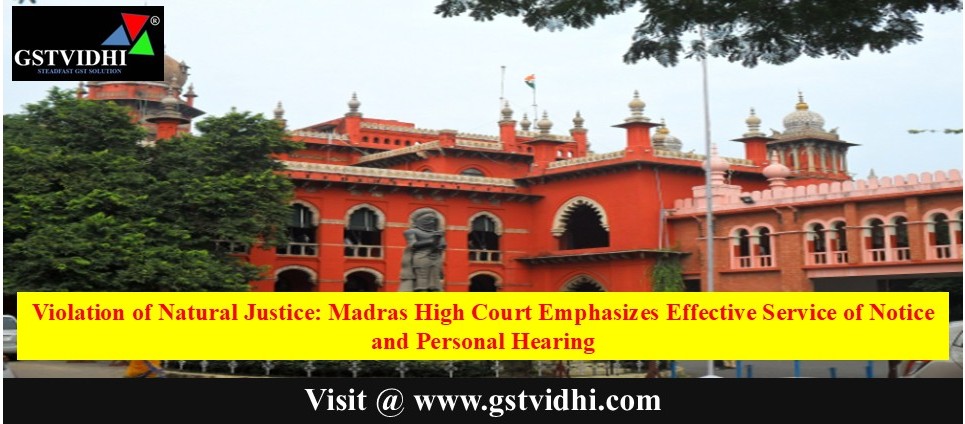
Violation of Natural Justice: Madras High Court Emphasizes
Effective Service of Notice and Personal Hearing
Summary of
the Case
The Madras High Court set
aside an ex parte assessment order passed under Section 73 of the TNGST/CGST
Act, 2017, holding that mere portal upload does not fulfill the purpose of
effective service if the taxpayer remains unaware. The petitioner, Techner
Engineers, was denied a fair hearing due to lack of proper notice. The case was
remanded, subject to a 25% pre-deposit, with specific directions to
afford a clear 14-day personal hearing notice.
· Tvl.
Techner Engineers v. The State Tax Officer
·
Court:
High Court of Judicature at Madras
·
Order No.:
W.P.No.24302 of 2025 & W.M.P.Nos.27356 & 27357 of 2025
·
Date of Judgment:
10.07.2025
Brief Facts
of the Case
- The respondent issued a Show Cause
Notice (SCN) under Section 73 for the FY 2018–19, which was uploaded
on the GST portal.
- The petitioner’s GST consultant failed
to inform them of the uploaded SCN.
- The petitioner missed the deadline
to respond and later sought 10 additional days to file a reply via Form
DRC-06.
- The request was ignored and an ex
parte assessment order dated 16.04.2024 was passed confirming tax
demands.
- The petitioner filed this writ
petition, alleging breach of natural justice, and offered to pay
25% of the disputed tax for a fresh hearing.
Submissions
by the Petitioner
Counsel: Mr. K.
Thyagarajan
- The SCN was never physically
served, and only uploaded digitally without any direct communication.
- No personal hearing was
granted before confirming proposals in the SCN.
- The order was passed without
considering the request for time extension.
- Offered to deposit 25% of the
disputed tax if the Court remands the matter for fresh consideration.
Submissions
by the Respondent
Counsel: Mr. C. Harsha
Raj, Special Government Pleader (Tax)
- Conceded
that the only form of notice was portal upload.
- Agreed to remand the matter, given
the petitioner’s willingness to make part payment.
Court’s
View and Reasoning
1. Portal
Upload Alone ≠ Effective Service
o Though
technically valid under GST law, uploading notices on the portal alone is
not sufficient where the taxpayer is unaware.
o The
court emphasized Section 169(1) of the CGST Act, which includes other
valid modes of service like RPAD, email, or physical delivery.
o The
judge stated:
“Merely fulfilling empty
formalities of portal upload will not serve any useful purpose and will lead to
multiplicity of litigations.”
2. Officers
Must Exercise Judicious Discretion
o When
repeated non-response is observed, GST officers should exercise discretion
and choose alternate modes to ensure real communication, not just
statutory compliance.
3. Personal
Hearing is Mandatory Before Final Orders
o Confirming
SCNs without hearing the taxpayer violates Section 75(4) and principles
of natural justice.
Final
Judgment
The High Court passed the
following directions:
1. Assessment
order dated 16.04.2024 is set aside.
2. The
matter is remanded to the respondent for fresh consideration.
3. The
petitioner shall:
o Deposit
25% of the disputed tax within four weeks of
receiving the order.
o File
a reply with all supporting documents within two weeks
thereafter.
4. The
respondent shall:
o Issue
a 14-day clear notice for personal hearing.
o Pass
a speaking order in accordance with law, considering the
petitioner’s reply.
5. No
costs were awarded. All connected miscellaneous petitions
were closed.
Conclusion
This judgment reinforces
the idea that procedural safeguards under GST must be meaningfully followed.
GST authorities must go beyond mechanical compliance and ensure taxpayers are truly
informed and heard, especially before initiating recovery or confirming
demands. The decision balances fiscal discipline with fair
adjudication, ensuring taxpayers get their day in court.
Disclaimer: All the Information is based on the notification, circular advisory and order issued by the Govt. authority and judgement delivered by the court or the authority information is strictly for educational purposes and on the basis of our best understanding of laws & not binding on anyone.
Find the Attachment (Press on Click Here )
Click here